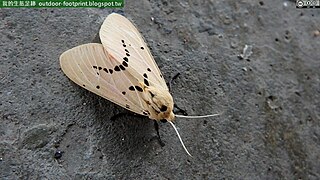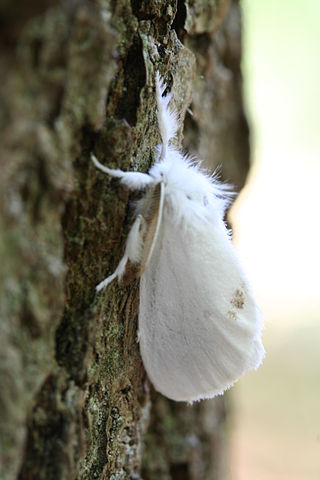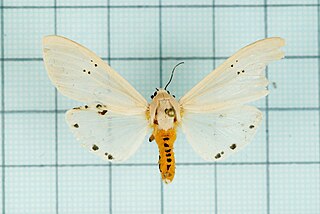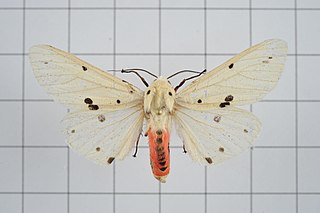
The buff ermine is a moth of the family Erebidae. It is sometimes placed in the genus Spilosoma. The species was first described by Johann Siegfried Hufnagel in 1766. It is found throughout the temperate belt of the Palearctic region south to northern Turkey, Georgia, Kazakhstan, southern Siberia, eastern Mongolia, Amur Region, China, Korea and Japan.

The Thyrididae comprise the family of picture-winged leaf moths. They are the only family in the superfamily Thyridoidea, which sometimes has been included in the Pyraloidea, but this isn't supported by cladistic analysis.

Spilarctia is a genus of moths in the family Erebidae. The genus was erected by Arthur Gardiner Butler in 1875.

Sphrageidus is a genus of tussock moths in the family Erebidae. It is considered a synonym of the related genus Euproctis by some authors, but still recognized as valid by others (e.g.), and supported as distinct in molecular phylogenetic studies.

Creatonotos transiens is a moth of the family Erebidae. The species was first described in Western literature by Francis Walker in 1855.

Spilosoma obliqua, the jute hairy caterpillar or Bihar hairy caterpillar, is a moth of the family Erebidae. It is found in south-eastern Afghanistan, northern Pakistan, India, Bhutan, Bangladesh and Myanmar.
Lemyra maculifascia is a moth of the family Erebidae. It was described by Francis Walker in 1855. It is found in China, Indonesia, Timor, the Philippines, New Guinea and Australia. It is found in secondary habitats, including bush, clearings in primary forests and plantations, from the sea level up to elevations of about 1,200 meters.
Spilarctia flavorubida is a moth in the family Erebidae. It was described by Vladimir Viktorovitch Dubatolov in 2006. It is found on Bali.
Spilarctia mindanao is a moth in the family Erebidae. It was described by Vladimir Viktorovitch Dubatolov and Yasunori Kishida in 2010. It is found on Mindanao in the Philippines.
Spilarctia palawana is a moth in the family Erebidae. It was described by Vladimir Viktorovitch Dubatolov and Yasunori Kishida in 2010. It is found in Palawan in the Philippines.
Spilarctia gurkoi is a moth in the family Erebidae. It was described by Vladimir Viktorovitch Dubatolov and Yasunori Kishida in 2010. It is found in the Mentawai Islands of Indonesia.
Spilarctia phaea is a moth in the family Erebidae. It was described by George Hampson in 1901. It is found on Bali in Indonesia.

Spilarctia alba is a moth in the family Erebidae. It was described by Otto Vasilievich Bremer and William Grey in 1853. It is found in China, Taiwan and Korea.
Spilarctia comma is a moth in the family Erebidae. It was described by Francis Walker in 1856. It is found in Tibet in China and in Bhutan.
Spilarctia sparsalis is a moth in the family Erebidae. It was described by Francis Walker in 1865. It is found on Sulawesi.

Spilarctia subcarnea is a moth in the family Erebidae. It was described by Francis Walker in 1855. It is found in Nepal, China, the Russian Far East, Korea, Japan and Taiwan.
Spilarctia cervina is a moth in the family Erebidae. It was described by Hans Daniel Johan Wallengren in 1860. It is found on Sumatra and the Mentawai Islands of Indonesia.
Spilarctia rubescens is a moth in the family Erebidae. It was described by Francis Walker in 1855. It is found in Myanmar, China (Yunnan) and on Sumatra.

Oreta obtusa is a moth in the family Drepanidae. It was described by Francis Walker in 1855. It is found in India, China, Myanmar and Indonesia.








